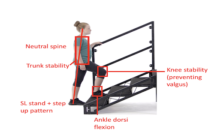A few weeks ago I made a post on my social media about my theory that 90% or more of athletes are overtraining.
I got absolutely LIT up with messages. People from all over the world were writing me that they had always felt the same, that they agreed, but had never heard someone say it quite like that. It appears that I am not the only one who thinks this way!
I thought I would follow up with what I believe is the #1 way to screen and prevent overtraining.
First, let me summarize some key techniques that people in the performance industry use to monitor and prevent overtraining:
- Health and Wellness Questionnaires – spreadsheets/ surveys to track and manage self-reported athlete health, sleep, fatigue and various training indices
- Heart Rate Variability – a measure of heart rate rhythms to determine if you are generally in a sympathetic or parasympathetic state
- Repeat Jump Ability – jump tests on force plates or jump mats to determine relative levels of neuromuscular activation
- Body Fat %/ Hormone Levels – Some sports science institutes may monitor body fat percentages or hormone levels on a very regular basis to assess athlete health.
These are all excellent techniques, and I would use each of these with pretty much all of my athletes and teams to some capacity. My only problem is that they take time and money to execute. You need a person or technology to administer, manage, and interpret this data so that it is actually used in a meaningful way to adjust programming- and not simply to impress people with the amount of data that you have collected.
What if I told you there was a simpler, completely accessible, and FREE way to screen overtraining? It comes in the form of one simple question:
Are you excited to train today?
In my experience this is the best way to elicit a meaningful, immediate, and rich conversation about overtraining. Athletes are built a certain way – they have a certain hunger and determination for what they do (if they didn’t they wouldn’t show up day in day out for the love of the game). A big part of your job as a coach is to step back and guide so that an athlete can use that natural determination to flourish.
As a coach, you want your athletes to be physically, mentally, and emotionally present in the moment for the work they are about to do in a training session. It is absolutely expected to have an off day, or to experience a short seasonal period of purposeful overreaching, but you know that if your athletes are persistently not excited to train – you are doing something wrong.
Bonus Tip: if your athletes experience consistent overtraining consider the following adjustments:
- Be specific: Prioritize what you want your athletes to work on – knowing that those adaptations require specific physiological and often counteractive parameters.
- Plan for recovery: map out purposeful time off over a training season, plan de-load weeks of volume and intensity, integrate recovery techniques on a weekly and daily basis.
- Prioritize health: “You can always do more tomorrow, but you can’t undue if you overdo it today” – Christopher Sommer
- Create systems: Create simple systems to continually monitor and improve your athlete wellness and screening. Systems will do the work for you without consuming time and resources.





